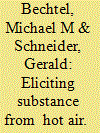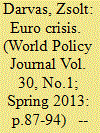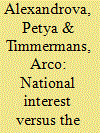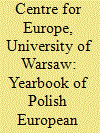|
|
|
Sort Order |
|
|
|
Items / Page
|
|
|
|
|
|
|
| Srl | Item |
| 1 |
ID:
095022


|
|
|
|
|
| Publication |
2010.
|
| Summary/Abstract |
The results of deliberations in multilateral fora are often considered ineffective. Decision making in the European Union (EU) and in particular its key intergovernmental body, the European Council, poses no exception. Especially in the domain of EU foreign and security affairs, the unanimity requirement governing this institution allegedly allows nationalist governments to torpedo any attempt to build up a credible European defense force and a unified foreign policy stance. In this article, we take issue with the claim that multilateral summits merely result in "hot air" by looking at whether and how decisions made during EU summit meetings affect the European defense industry. We argue that investors react positively to a successful strengthening of Europe's military component-a vital part of the intensified cooperation within the European Security and Defense Policy (ESDP)-since such decisions increase the demand for military products and raise the expected profits in the European defense industry. Our findings lend empirical support to the view that financial markets indeed evaluate the substance of European Council meetings and react positively to those summit decisions that consolidate EU military capabilities and the ESDP. Each of the substantial council decisions studied increased the value of the European defense sector by about 4 billion euros on average. This shows that multilateral decisions can have considerable economic and financial repercussions.
|
|
|
|
|
|
|
|
|
|
|
|
|
|
|
|
| 2 |
ID:
119876


|
|
|
|
|
| Publication |
2013.
|
| Summary/Abstract |
Brussels-High unemployment, bleak economic outlook, high public and private debts, dysfunctional banks, weak competitiveness, and an unfavorable external environment are just a few of the challenges facing southern members of the euro zone. Despite these hurdles, the ever-optimistic European Council and other leaders said in January that the euro crisis had bottomed out. Herman Van Rompuy, the president of the European Council, proclaimed, "The worst is behind us, in particular the existential threat to the euro." Then there was Mario Draghi, president of the European Central Bank (ECB), who declared that "the darkest clouds over the euro area [have] subsided."
|
|
|
|
|
|
|
|
|
|
|
|
|
|
|
|
| 3 |
ID:
142901


|
|
|
|
|
| Summary/Abstract |
The European Council met in London on the first of May 1998 to announce the final decisions regarding the countries that are eligible to proceed to European Monetary Union (EMU). The next day, the selected countries met in Brussels to make the decisions required to implement the decisions. The six executive directors of the European Central Bank (ECB) were appointed, including the president and vice president, and the designated countries will lock exchange rates by 1 July at the latest, and the ECU will become the euro on 1 January 1999. On this date, the process of replacing national currencies by euros within banks will begin. On 1 January 2002, the circulation of euro banknotes and coins will begin, to be completed within six months, when the legal tender status of national banknotes and coins will end.
|
|
|
|
|
|
|
|
|
|
|
|
|
|
|
|
| 4 |
ID:
116362


|
|
|
|
|
| Publication |
2012.
|
| Summary/Abstract |
Regular meetings of heads of state and government seem, in 2012, a common feature of international affairs. About forty years ago, however, such meetings did not really exist: ad hoc summits were the rule. Comparing the emergence of the European Council in 1974 and the G7 in 1975, this article explains why and how summitry has become routine in international politics. To do so, it examines the common roots of both summits, points out the first differences between the two institutions, and, finally, underlines the common challenges they faced and the logic they shared. Taken together, these three parts underline how, despite their obvious differences, the European Council and the G7 created a new dimension of international politics.
|
|
|
|
|
|
|
|
|
|
|
|
|
|
|
|
| 5 |
ID:
120143


|
|
|
|
|
| Publication |
2013.
|
| Summary/Abstract |
The European Council is an institution which brings together the Heads of State, or Governments of the European Union (EU) Member States. For the Presidency, preparing the agenda of European Council meetings involves a tension between loyalties. Existing research is divided over the question whether the Presidency pushes its domestic policy agenda on the EU level. Using empirical data on the Conclusions of European Council meetings, and national executive speeches presented annually in five Member States, this article investigates the relationship between the policy agendas of the EU and its constituent countries. It tests whether national issue attention of the Presidency holder dominates the European Council agenda. The findings suggest that having the Presidency does not provide a de facto institutional advantage for agenda setting power for any of the countries in the sample. The analysis points out that normative and political constrains limit the leeway of presiding Member States to push for domestic agenda preferences in the European Council.
|
|
|
|
|
|
|
|
|
|
|
|
|
|
|
|
| 6 |
ID:
056267


|
|
|
| 7 |
ID:
129681


|
|
|
|
|
| Publication |
2014.
|
| Summary/Abstract |
This analysis takes its cue from Richard Langhorne's contribution on the continuities of diplomacy and the nature of the European Union [EU] as a diplomatic actor. It traces the institutional changes following the 2009 Lisbon Treaty, looking at the rationale for and the foreign policy roles of the president of the European Council, the High Representative, and, particularly, the European External Action Service [EEAS]. The creation of the EEAS has been especially contested, largely as a product of continuing competition amongst European institutions and the member states. The outcome, however, has been a more visible European diplomatic service that increasingly provides authoritative information to member states, many of whom have limited representation of their own. Whilst that potentially strengthens the role of the High Representative in policy-making, it still leaves many member states determined to see EU diplomacy in support of rather than as a substitute for their own.
|
|
|
|
|
|
|
|
|
|
|
|
|
|
|
|
| 8 |
ID:
097007


|
|
|
|
|
| Publication |
Warsaw, Centre for Europe, University of Warsaw, 2009.
|
| Description |
266p.
|
| Contents |
Vol 12/2009
|
| Standard Number |
14281503
|
|
|
|
|
|
|
|
|
|
|
|
Copies: C:1/I:0,R:0,Q:0
Circulation
| Accession# | Call# | Current Location | Status | Policy | Location |
| 054919 | 332.094/CEN 054919 | Main | On Shelf | General | |
|
|
|
|
|
|
|
|
|